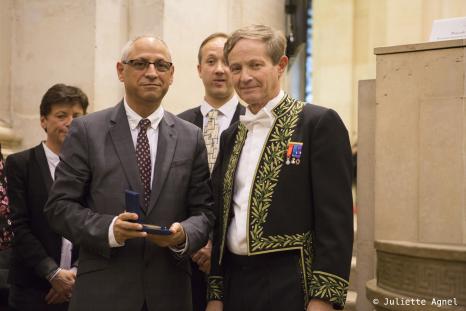
Elias Fattal: delivering drugs as close to their target as possible
Elias Fattal is a lecturer at the Paris-Saclay Galien Institute (IGPS - Univ. Paris-Saclay, CNRS), where he was its director from 2010 to 2019. He specialises in nanomedicine, to which he has dedicated 40 years of research. His recent work focuses on designing nanoparticles for the treatment of inflammatory diseases and pulmonary nanotoxicology.
After completing a scientific baccalaureate, Elias Fattal began studying pharmacy at Université Paris-Sud (now Université Paris-Saclay). Why did he choose this discipline? Undoubtedly due to the influence of a pharmacist grandfather and a photographer father, with whom he spent long hours in the darkroom, developing a taste for chemistry, which is highly prevalent in pharmacy. He obtained his doctorate in pharmacy in 1983 and initially pursued a career in hospital pharmacy. He spent three years as an intern in hospitals in northern France, before deciding to dedicate his fourth year to research. In 1986, he joined the Physical-Chemistry, Pharmaceutics and Biopharmacy unit, the forerunner of the Paris-Saclay Galien Institute, to complete a 2nd year master's degree in research. He worked under the supervision of Patrick Couvreur, a pioneer in nanomedicine and then a young professor, becoming one of his first PhD candidates. He defended his thesis on the treatment of intracellular infections with antibiotic polymeric nanoparticles in 1990. He then spent two years as a post-doctoral fellow at the University of California, San Francisco, an experience that would completely transform him.
The early stages of galenic research
"During my time in San Francisco, I conducted experiments that helped to explain the mechanism of action of lipid nanoparticles loaded with nucleic acids," recalls Elias Fattal. "Published in Biochemistry in 1994, these studies continue to be highly cited 30 years later." In San Francisco, he worked closely with Francis Szoka, one of the pioneers in the design of lipid nanoparticles. On returning to France in 1992, he became a lecturer in galenic pharmacy at Université Paris-Sud, obtaining his Accreditation to Supervise Research in 1996 and becoming a professor four years later. He has continued his work on nucleic acid nanoparticles. "Unlike viruses, the vectors we've designed are created from chemical molecules. Nucleic acids, antisense oligonucleotides and interfering RNAs, which control gene regulation, need to be administered using these nanoparticles in the same way that messenger RNA vaccines are administered today."
Targeting inflammatory diseases
Elias Fattal's recent work focuses on the treatment of inflammatory diseases. Along with Xavier Mariette, Professor of Rheumatology at the Faculty of Medicine of Université Paris-Saclay, he discovered that vectorizing a short nucleic acid fragment, known as antagomir, corrects certain biological processes involved in rheumatoid arthritis. "The nanoparticles are captured by certain immune cells involved in the pathology, and the antagomirs released modify the behaviour of these cells by providing them with anti-inflammatory functions."
The lecturer is also interested in the possibility of delivering drugs directly to organs such as the lungs. "We're now developing interfering-RNA lipid nanoparticles by inhalation to treat inflammatory lung diseases. We coat these nanoparticles with elements recognised by the specific cells in lung tissue involved in these diseases." Elias Fattal has benefited from collaborations arising from the creation of the PROMETHEUS University Hospital Institute (IHU) to try and develop pulmonary vectorization approaches for small molecules such as dexamethasone. This molecule has proved effective in treating the acute inflammation experienced during coronavirus disease. "Our aim is to facilitate its administration through inhalation by delivering it as close to the target as possible."
Towards nanotoxicology
However, in some cases, manufactured nanoparticles, such as those made from titanium oxide, can generate pulmonary toxicity. "To avoid this toxicity, we're looking to develop systems that are either produced from natural compounds such as lipids, or composed of biodegradable polymers that the body can assimilate or eliminate completely, and which have demonstrated excellent safety in our studies." This work on pulmonary nanotoxicology is a speciality of Elias Fattal's team, which explains their involvement in the European Commission's reports tasked with addressing these issues.
Passing on the passion for research
Although Elias Fattal's research benefits from various sources of funding, both public and private, the lecturer never loses sight of his ultimate goal: to save lives. "Industrial valorisation is a means of advancing this research towards real-world applications for medicine." In fact, he holds 14 international patent families, including one in the field of nuclear decontamination, which saw him develop a cream designed to treat people contaminated by injuries sustained in nuclear power plants in partnership with the Institute for Radiation Protection and Nuclear Safety (IRSN) and the company CEVIDRA.
According to Elias Fattal, the recent relocation of the Paris-Saclay Galien Institute from Châtenay-Malabry to the Plateau de Saclay will foster new collaborations. A few years ago, he became Vice-Dean of Research for the Faculty of Pharmacy, and is now keen to engage in scientific outreach activities. He uses this privileged position to encourage the younger generation to become involved in research. "Despite the increasing responsibilities that weigh heavily on the careers of lecturers, I'm very proud to have taken the time to share my passion for research with students. Starting from their third year in pharmacy, I invite them to spend a month in my laboratory over the summer. Many of them have since returned to pursue a thesis." This mission to raise awareness of research has since been formalised within the Faculty of Pharmacy.
Advancing knowledge
Having gained international recognition very early on, Elias Fattal has already collaborated on a number of projects abroad, including in Brazil and Italy. His career has been marked by countless awards, including the Dr and Mrs Henri Labbé Award, presented by the French Academy of Sciences in 2016. This award recognised his work at the interface of chemistry and biology and holds a special place. In 2018, he received the Maurice-Marie Janot International Award from the International Society for Drug Delivery Sciences and Technology (Association de pharmacie galénique industrielle - APGI). "Recognition from one's peers helps dispel the doubts of any researcher." Elias Fattal is also a member of the European Academy of Sciences (EURASC) and the French National Academy of Pharmacy, and has been a member of the French National Academy of Medicine since 2022. He has also received two international awards in the field of pharmaceutical sciences, the Pharmaceutical Sciences World Congress Research Achievement in 2007 and the Controlled Released Society Fellow Award in 2016.
Elias Fattal believes that the daily acquisition of new knowledge is more important than career development. He has fond memories of his early work on interfering RNAs, a key moment in his life as a researcher, when he discovered "directly, on biological material , that we can turn off a gene involved in a pathology. I thought to myself: you see, you can go even further."

